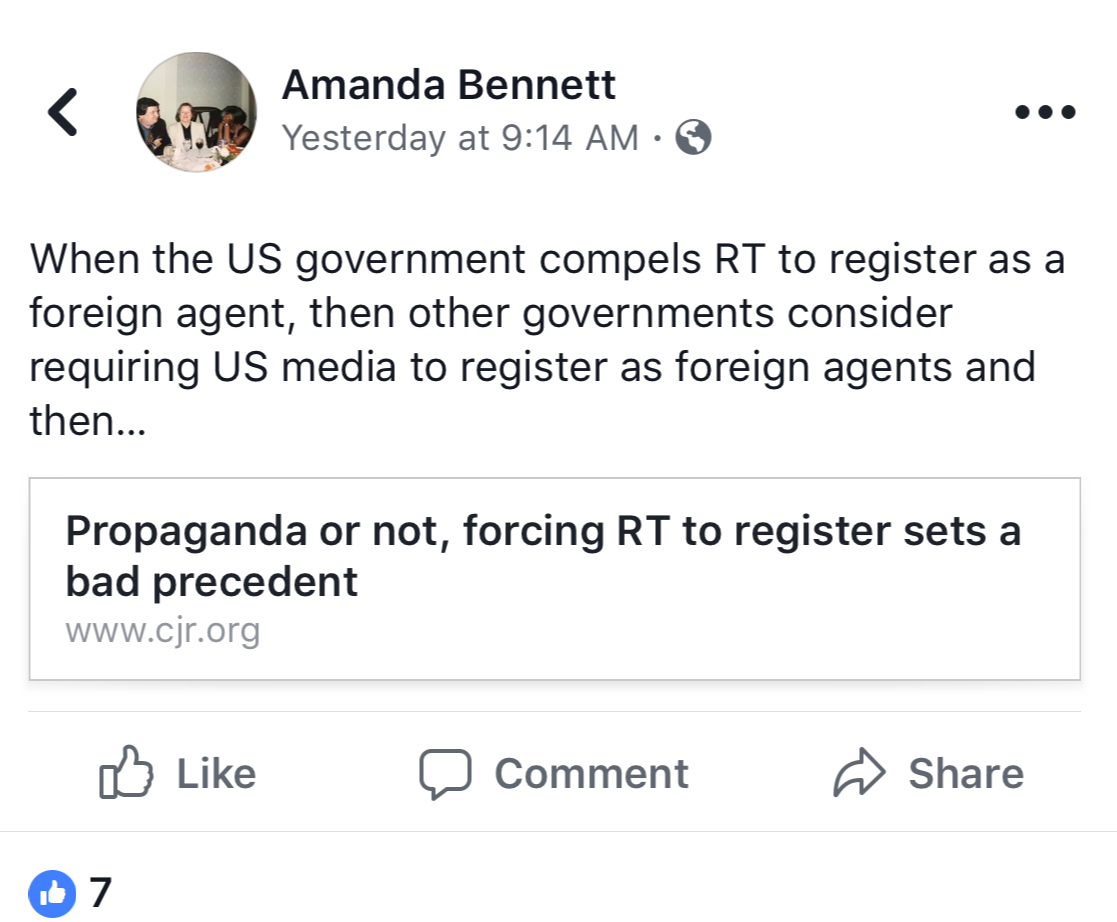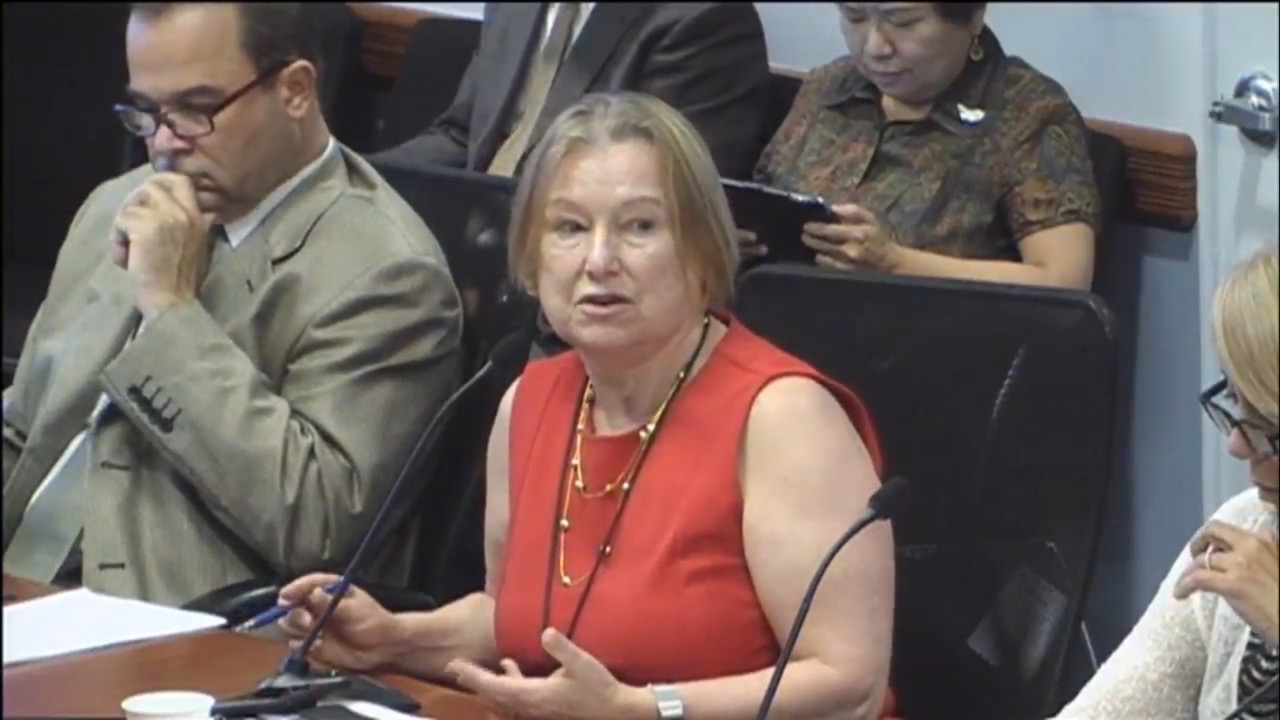OPINION
BBG Total Meltdown Mode 3.0
Broadcasting Board of Governors Information War Lost
By The Federalist
Before it was removed from one of her Facebook page, Amanda Bennett, Voice of America (VOA) director posted the following:
“When the US government compels RT to register as a foreign agent, then other governments consider requiring US media to register as foreign agents and then…”

Ms. Bennett’s reaction was to an article by Joel Simon appearing in the Columbia Journalism Review (CJR) dated December 1, 2017.
In brief, the article bemoans the decision by the US Government requiring the Russian media outlets RT and Sputnik to register as agents of a foreign government. According to the author, the decision sets a dangerous precedent.
Ms. Bennett appears to agree with the author’s sentiment, perhaps in part because the Russian government has reciprocated with the same requirements imposed on VOA and Radio Free Europe/Radio Liberty (RFE/RL). Frankly, at this point, considering intensified Russian security service’s (FSB) activities against the BBG, having a large official BBG presence in Russia is an invitation to FSB interference, pressure, and blackmail.
As noted, the post has been removed from one of Ms. Bennett’s Facebook pages. Briefly, it would appear that Ms. Bennett, an Obama administration holdover, lost sight of the fact that she is a US government official in a new administration and that her views did not reflect the views or actions of the US Government.
In turn, we juxtapose the views of Ms. Bennett and the CJR piece with those of another opinion piece by David Von Drehle appearing in the Washington Post on November 17, 2017:
We will reflect on the Von Drehle piece first before returning to Ms. Bennett and the CJR article. This article should be required reading for its own sake and also for its reflection on the dysfunction within US Government international broadcasting.
Mr. Von Drehle gets down to business:
“The United States and its allies are under attack. The cyberwar we’ve feared for a generation is well underway, and we are losing. This is the forest, and the stuff about Russian election meddling, contacts with the Trump campaign, phony Twitter accounts, fake news on Facebook – those things are the trees…”
In the case of the BBG/VOA they don’t see the forest or the trees. To be certain they claim that they do, but it is nothing more than hollow posturing where the intended outcome is not mission success but their own self-preservation. We know exactly how the Kremlin feels about the BBG/VOA. Giving the boot to former BBG chairman Jeff Shell, sending him out of Russia before he was even able to step foot outside of the Moscow airport, was the defining moment. While still serving as the Democratic chairman of the BBG board, he went there on what was described as private business, presumably for the Hollywood film and entertainment company he runs in his private business career. The question arises, why would the top US government official overseeing our country’s critical international media outreach be going to Russia on private business accompanied by two BBG executives? Why these two BBG executives allowed BBG chairman to go to Russia, a country run by President Putin’s FSB security service, carrying his regular US passport when he could have gone there with his diplomatic passport and diplomatic visa? What kind of meetings with Russian government officials were being arranged by BBG employees for his visit? And why would the then BBG chairman be doing any kind of corporate business in countries without free media to which the agency directs its critical broadcasts?
The Russian government has nothing but contempt for the dysfunctional enterprise the agency has become and is without fear in making the point.
Mr. Von Drehle wrote how the US has shown its lack of clear thinking in another area of Russian interference:
“…we failed to prepare for an attack of great subtlety and strategic nuance. Enemies of the West have hacked our cultural advantages, turning the very things that have made us strong – technological leadership, free speech, the market economy and multi-party government – against us. The attack is ongoing…”
Von Drehle also takes aim at Julian Assange, Wikileaks founder, referring to him as a Russian sympathizer. In our view he is every bit of that and more. He is an anarchist intent upon taking down Western governments much to the delight of his Russian handlers, while he hides out in the Ecuadorean embassy in London on a preposterous claim of political asylum. He is also accused of rape, a charge he denies. Even without the contested rape accusations, Mr. Assange is no paragon of virtue by any means.
The Von Drehle op-ed piece deserves reading in its entirety. But the message is clear: the Russians hold the advantage in cyberwarfare.
As we have mentioned previously, the Russian strategy is simple: they will run their playbook until someone stops them. So far no one has come up with an effective counter to that playbook.
Without being mentioned, this article is an indictment of the BBG and its role in the failure to counter Russian propaganda. To be sure, the Broadcasting Board of Governors and Ms. Bennett would like one to believe that its Russian-language “Current Time” TV program is an effective counter to Russian government’s programming on RT and Sputnik.
It is not.
The BBG and Ms. Bennett might lay claim that they are at least trying. But what we’ve seen with this agency is a rather consistent record of trial and error/trial and failure, with programs that come and go often without explanation. But in fact the explanation is there to behold: replacing one program with another is the clearest indication that the program content is having no material impact.
What we see instead is reflected in Ms. Bennett’s now-deleted Facebook post and the CJR article.
In short, the argument offered by Mr. Simon and embraced, even briefly, by Ms. Bennett is dead-on-arrival. The argument over the rightness or wrongness of registering media as foreign agents is over, at least in the foreseeable future.
The rules of engagement have changed.
Instead of trying to find a way to make the current circumstances work to disrupt the Russian playbook, they are whining over the loss of lofty sentiments.
Objective journalism in commercial US media, if not already dead, is certainly dying. It has been replaced by partisan advocacy in commercial media. Under Ms. Bennett and her boss, BBG CEO John Lansing, objective journalism has also been largely replaced at the Voice of America, in violation of the VOA Charter, with partisan advocacy of the Democratic Party’s domestic and foreign policy policy positions, be it on immigration reform or Iran. People need to understand that. Advocacy of the Republican Party’s partisan positions would be just as bad, but the fact is that the Trump administration has not yet done anything to politicize VOA in such a way, at least not until this moment. VOA has been made partisan, however, in favor of the Democratic Party’s policy positions to an unprecedented level under the watch of Ms. Bennett and her deputies. The VOA Charter does not allow such partisanship through program content.
People also need to understand that today’s media plays to what is called “confirmation bias:” seeking to appeal to sentiments by one or another segment of national populations to a certain point of view. VOA’s reporting on such topics as immigration reforms and many others has been entirely partisan in favor of the Democratic Party’s point of view despite the fact that historically, and even until recently, VOA journalists have tried to avoid such overt partisanship. Something strange and disturbing happened at VOA in the last two years.
The Voice of America in particular needs to be acknowledged as an agency of the US Government, that it gets its mission direction from the VOA Charter. It is not now nor has it ever been “an independent news organization.” Its failure to follow the Charter, to allow it to be seen as being one-sidedly against the Trump administration in a variety of its posts documented on BBG Watch intentionally insinuates a distorted view of its place in international media.
This agency needs to come clean with itself and global publics as to what it is. It must stop being a platform for partisanship.
And just as importantly, it needs a serious makeover to conform to and confront current and future threats. It has no serious strategic vision as its imbedded bureaucracy tries to justify its increasingly unjustifiable existence.
The most effective makeover would be a transfer of function to get the agency’s mission out of the hands of this self-serving, inept and incompetent bureaucracy.
In the immediate sense, what is most needed is replacing the Obama administration appointees John Lansing (agency CEO) and Ms. Bennett (VOA director). Both have gone a long way to make the agency toxic and marching in lock step with the bureaucrats who have created the toxicity and failure.
Even on an interim basis, an emergency management team of individuals outside the agency is very necessary. This is commonly referred to as “adult supervision” to counter the agency’s constant reference to problem solving as “baby steps,” a BBG term of art that is quite revealing of the mindset of its senior officials. It’s a term that is all about obstruction, defiance and maintaining the status quo that ultimately results in the agency being useless in its present construct.
The BBG also has to be sent packing. To all appearances, its functionality and utility are to maintain business as usual.
New vision is necessary and it is necessary now.
Finally, one last observation:
In looking over Ms. Bennett’s two Facebook pages – one personal and one in her capacity as VOA director – one thing jumps out immediately: the paltry number of likes, comments or views on her pages.
This is making a rather large statement of ineffectiveness in the context of the agency’s decidedly false narrative about its engagement in social and digital media. If the VOA director cannot generate any substantial or sustained traction on a regular basis, it doesn’t say much about the agency as a whole.
In short, the truth has revealed itself and it isn’t promising for the agency’s current or future existence.
The Federalist
January 2018

